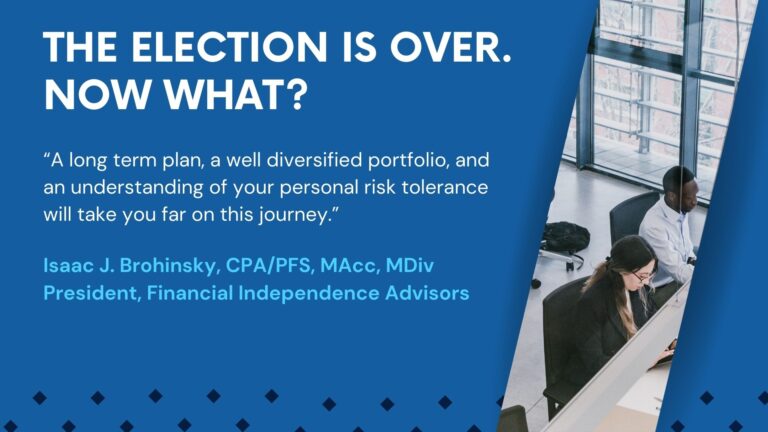
Guest Blog Writer: Isaac J. Brohinsky, CPA/PFS, MAcc, MDiv
President, Financial Independence Advisors
Every election season we get questions about which candidate is going to be best for the economy and what changes people should make based on the election. My answer is always the same: don’t make long term financial decisions based on short term volatility.
US stocks have on average been up the 12 months following an election. On average, they have been up the second year after an election, third year after the election, and during election years (1). This is somewhat expected since US stocks have historically risen over the long term, even when we average in years like 2001, 2008, and 2022. Sector performance and overall S&P 500 performance tends to be historically agnostic towards the party controlling the White House. Ultimately, consumers have the final say in where their dollars are spent.
It is important to focus on your long term goals versus short term circumstances. The best way to derail your financial plan is to make fear based decisions. No matter who is elected, we will still find ourselves at the store the next day buying our daily essentials and the luxuries we want and can afford.
The clearest policy we see coming from the election results will be the likely renewal of many of the Tax Cuts and Jobs Act policies that were set to expire. The extension of current tax policy could provide some stability, and markets have often reacted well to stability. Some of the tax cuts that were talked about by both sides such as ending taxes on tips will likely be difficult to get past Congress even with one party controlling both houses and the executive. Tax cuts and new spending contribute to one of the biggest headwinds we may be facing, which is growing US debt. Eventually this will need to be addressed as our debt service costs take up more and more of the government’s budget.
The more immediate question we continue to watch is inflation versus Fed interest rates. The Fed kept with what many were projecting and cut interest rates another 25 basis points in November. Interest rate cuts can help spur economic growth and drive some investors from fixed income to equities. However, the Fed is playing a tough balancing act with inflation. In the short term, a resurgence of inflation causing the Fed to reverse course on interest rates could produce significant short term market volatility.
In the short term, markets will always be somewhat volatile. This can provide opportunities, but it can also provide discomfort for long term investors. A long term plan, a well diversified portfolio, and an understanding of your personal risk tolerance will take you far on this journey. Take comfort in the fact that election season will rarely affect our decisions to keep up our personal hygiene, take our medications, eat, use technology, and take advantage of the goods and services that companies provide. This is why I continue to say don’t make long term financial decisions based on short term volatility. When it comes to saving for financial independence, a steady approach has been rewarded over time.
Isaac J. Brohinsky, CPA/PFS, MAcc, MDiv
President, Financial Independence Advisors
Linkedin
Isaac J. Brohinsky is the President of Financial Independence Advisors, LLC. Isaac has almost two decades of experience with business taxation and working with the IRS and other tax authorities as a licensed CPA/PFS. He focuses on personal and business taxation, business consulting and outsourced CFO services, and financial planning.
1. https://www.fidelity.com/learning-center/trading-investing/election-market-impact
Disclaimer: Past performance is not an indicator of future results. This article is not a recommendation to buy or sell, and references to past performance are for education purposes only. We recommend speaking with an investment advisor before making any changes to your financial plan.
